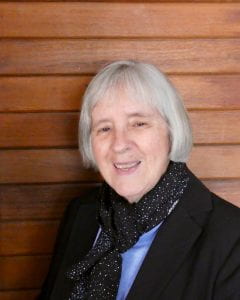In the late 1980s, a convicted Aboriginal man, who had always protested his innocence, was released and compensated by the government for seven years of wrongful imprisonment. He had been convicted on the basis of a typed ‘confession’ which he claimed was not what he had told police.
This was the first major case UNE adjunct professor Diana Eades would be called on to provide an expert report and evidence into the way Aboriginal people could be disadvantaged in the legal process by their speech patterns.
“I was reluctantly drawn into providing an expert linguistic report in this case – I’d only recently completed my PhD research in linguistic anthropology, which had shown that many Aboriginal people who speak English as their first language, use English in Aboriginal ways,” Professor Eades recalls.
“A lawyer and an Aboriginal social worker saw the relevance of this research to Aboriginal people in police interviews and in courts, and connected me with lawyers looking for expert reports.”
Since that case in the 1980s, Professor Eades began to focus her work specifically on Aboriginal people in the legal process, and how language works in the law.
“This case opened my eyes to a wide range of issues about how cultural and linguistic subtleties are part of the complex ways in which the legal system can fail Aboriginal people, and since then that has been what drives me and much of my research.”
Professor Eades’ expertise has since been called on many times by lawyers, judges and magistrates to analyse police interviews and other evidence to determine if there are any communication issues which could rule them inadmissible, or that need to be considered when the evidence is presented in court.
“It is impossible to understand what people say without understanding the social and cultural context in which they live, and the interactional context in which they are speaking,” she says.
These differences can, for example, shape the way a witness retells events.
“A central belief held in our legal system is that a witness’s recollection of events will be told consistently and identically if the witness is honest – from the initial police interview to questions in court including in cross-examination.
“For any witness not legally trained and experienced, this is not always natural; people tend to retell events in slightly different ways depending on the situation. And the problem is compounded for many Aboriginal speakers of English, because of differences in the ways in which English is used.”
She pinpoints two areas of cultural difference that can tend to work against Aboriginal people if not properly understood by the courts.
“Unlike many others, Aboriginal societies value silence before speaking, especially if an issue is important and requires thought. But if this isn’t understood by a lawyer or judge, the witness may not be given the time they need to answer. To a jury, it can be interpreted as being dishonest or uncooperative.
“This is one of the central findings of my research which can have a wide-ranging impact on the way that Aboriginal people participate in courtroom hearings and with how their evidence is evaluated,” she says.
Another often misinterpreted cultural difference, she says, is the use of the word ‘yes’ in answer to interview questions.
“An Aboriginal witness who answers ‘yes’ to repeated questions, may not necessarily mean to agree with what they are being asked. They may not necessarily even understand some of the questions. Of course lawyers and judges need to understand this, and there is increasing awareness through legal and judicial training, but it is not universal.”
As well as writing expert reports for criminal justice cases, Professor Eades has written a handbook for lawyers communicating with Aboriginal speakers of English, run training workshops and given lectures for lawyers, judges and magistrates. She’s committed to contributing to changes which can help bring about fairer trials for Aboriginal people and others from diverse backgrounds.
Her research has been cited in the Federal Court, the Northern Territory Supreme Court, the Queensland Court of Appeal, the Supreme Court of Western Australia, and most recently, in the High Court of Australia.
In 2014, for example, Professor Eades’ analysis of the police interview of an Aboriginal man was directly used by the Western Australia Supreme Court in ruling that he should have been provided with an interpreter, and that his apparent ‘confession’ to the police could not be held against him.
In 2016, a magistrate in Western Australia directed a defence lawyer to seek an expert opinion from Professor Eades about an Aboriginal accused man, before she would decide on whether any cultural and linguistic communication problems were present in the police interview that should rule it inadmissible.
On receiving the analysis and conclusions, the magistrate did rule the interview inadmissible.
Professor Eades hopes this increasing understanding of the impacts of cultural and linguistic difference will also extend to juries.
“Juries need to be informed about how Aboriginal culture impacts the use of English, in order to properly understand and evaluate the evidence of many Aboriginal witnesses, especially those who have not had opportunities through education and employment to develop strong bicultural abilities,” she says.
Most recently, in 2020, Professor Eades’ research was also cited in the High Court of Australia, in a judgement which ruled that a defendant would not have a fair trial if his interview with police was not made available for the jury.
The prosecutor’s argument, that the defendant could give evidence in court if he wanted the jury to hear his side of the story, was addressed specifically by one of the judges. In referring to Professor Eades’ research, he ruled that such exposure to cross-examination, in order to let the jury hear what he had already told police, would be “extremely likely” to result in an “unfair trial”, given the “cultural and linguistic disadvantages” of the Vietnamese defendant that were “plainly evident”.
“It is exciting for me to see that one of the High Court judges in this case adopted some of my research, as it shows some legal experts can recognise the relevance of linguistic problems in the legal system to other cultural and linguistic groups, besides the Aboriginal groups I have specifically worked with.”
For Professor Eades, the importance of the holistic understanding of language that the field of linguistics offers cannot be underestimated across a range of contexts.
“When we communicate we are always taking into account not just what words mean, but what people mean by using these words.
“So much of what we do in any sphere of life depends on language, so the study of language will always be essential in the study of people and society.
“I have always wanted my research to play some part, however small, in addressing social inequality, and there are many ways that linguistics can make a contribution.”




I suspect this approach would be increasingly useful with mainstream (white) persons also entering the justice system, as the educational system seems to be failing them with regards to literacy and comprehension.